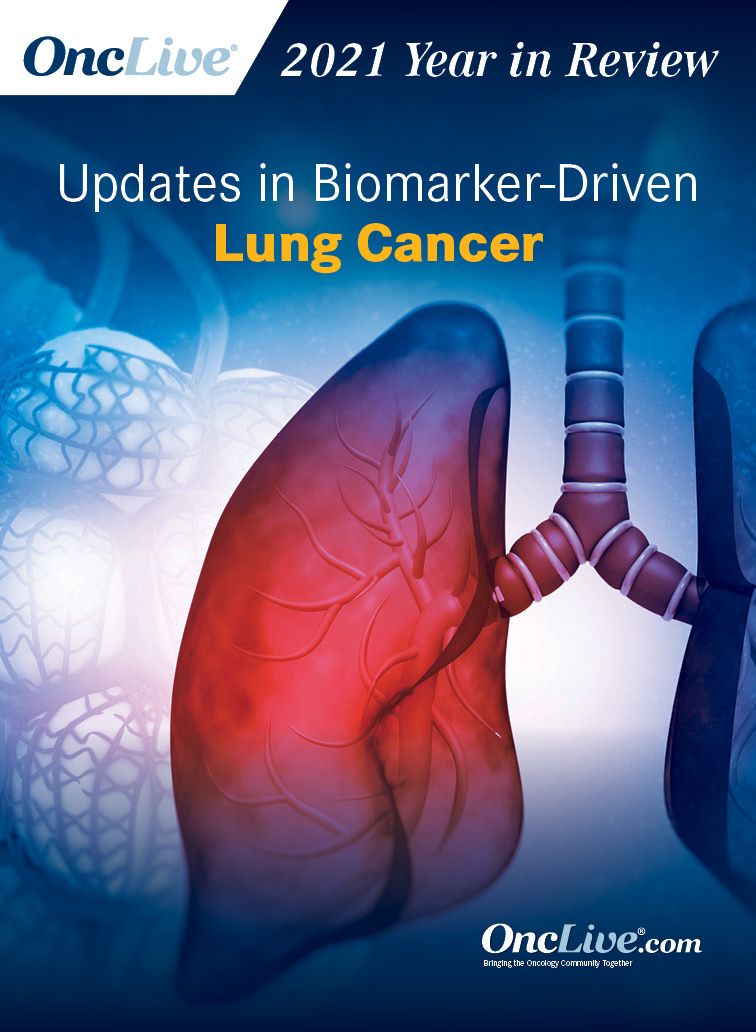Publication
Article
Supplements and Featured Publications
Shifting Regulatory Approval Pathway Is a Top Takeaway of 2021 in Lung Cancer
Author(s):
The shift away from accepting only positive overall survival (OS) data from phase 3 trials as the pathway toward regulatory approval has been the biggest takeaway from 2021 in lung cancer.
David Spigel, MD

The shift away from accepting only positive overall survival (OS) data from phase 3 trials as the pathway toward regulatory approval has been the biggest takeaway from 2021 in lung cancer, explained David Spigel, MD, citing the approvals of sotorasib (Lumakras), amivantamab-vmjw (Rybrevant), and mobocertinib (Ekivity), which were all based on phase 1/2 trials.
“My take on 2021 from a regulatory perspective is this collaboration and willingness to get drugs out there in these settings where we haven’t had great strategies based on early data sets [instead of] waiting for randomized phase 3 trials to be finished in the case of sotorasib, amivantamab, and mobocertinib even though those studies are being done. [What we’ve seen is that we’re instead able to] get drugs out there based on promising early data, which has been great,” said Spigel.
In an interview with OncLive®, Spigel, chief scientific officer and director of the Lung Cancer Research Program and principal investigator at Sarah Cannon Research Institute, provided his perspective on the biggest takeaways from 2021 in lung cancer.
OncLive®: Based on the number of accelerated approvals over the past year, do you think the field has become more accepting of end points other than OS?
Spigel: The big stories for me would be the adjuvant approval of atezolizumab [Tecentriq] in early-stage disease, the accelerated approval of sotorasib in KRAS G12C–mutant disease, and the accelerated approval of 2 [EGFR] exon 20 insertion therapeutics: amivantamab and mobocertinib. It’s somewhat controversial, but we’re getting used to the idea that drugs could get approved based on shorter-term outcomes or end points like disease-free survival [DFS] instead of waiting for OS.
I know that’s been a sticking point with a lot of people about adjuvant osimertinib [Tagrisso] use from the ADAURA trial [NCT02511106], in which the approval was based on DFS end points not OS. As I mentioned, now atezolizumab is approved based on a DFS end point. We’ll have to see if OS matures enough to prove positive for both those examples, but even if it didn’t: Is that a reason these drugs shouldn’t be available? In the case of osimertinib appearing to reduce the occurrence of CNS [central nervous system] metastases: Is that not a meaningful end point? Do we have to expect OS improvement? That will be stuff for us to debate in the years to come, but this is probably the biggest take-home for 2021 in terms of regulatory perspectives.
What is your expectation for research in 2022 with regard to targeted therapy?
There’s a lot of work is looking at the role of antibody-drug conjugates [ADCs], which are showing early promise in a variety of tumor settings. These are drugs that target different areas in tumors. TROP2, CEACAM5, HER3, HER2, and B7H3 are targets that are expressed at various levels. There are a lot of targets out there. The biggest data recently have been in HER2 targeting and some of the early data against TROP2 have been exciting in leading to potential accelerated approval strategies in non–small cell lung cancer [NSCLC]. It wouldn’t surprise me if in 2022, we have 2 ADCs approved in the HER2 population and in the TROP2 population with phase 3 trials in progress.
In the next 1 to 3 years, there’s going to be a slew of neoadjuvant and adjuvant immunotherapy studies maturing that will be exciting to think about how to incorporate hopefully positive results into our standard treatment paradigm. There’s still some work to do in the post-osimertinib setting [to see] whether drugs like amivamtamab could play a role, or new agents altogether, but a lot of exciting things are happening in NSCLC.
In small cell lung cancer [SCLC], we had no big stories in 2021 other than lurbinectedin [Zepzelca], which was approved in 2020. We saw a negative phase 3 study with lurbinectedin vs topotecan or cyclophosphamide, doxorubicin and vincristine, but it was a lower dose of lurbinectedin combined with doxorubicin. I don’t think lurbinectedin is going to get withdrawn from the market, but the bar is still somewhat low to get another agent out there in 2022 or beyond. That might be an ADC, or it might be a bispecific antibody. It might even be another cytotoxic like liposomal irinotecan.
There’s been some exciting, early work with immunotherapy in limited-stage SCLC that’s in development. There’s a lot of work to do, and a lot of exciting things are on the horizon. Perhaps now that we’re getting back to in-person meetings, we’ll be able to have more conversations about how to how to best study these agents and hopefully get them approved quicker.
What advice would you give to oncologists to be able to stay abreast of all these advances?
We have so many brilliant providers across our network, and certainly outside of our network. I continue to think about the challenge of keeping up with all this and being so sophisticated with things like gastric cancer, esophageal cancer, breast cancer, and not to mention hematologic malignancies. There’s a lot happening.
There’s a lot of resources out there, whether it’s one on one conversations or emailing or texting, or great resources like the National Comprehensive Cancer Network, ASCO, and AACR. Keeping up with the data is challenging but know that there’s a lot of resources out there and that it’s going to get hopefully easier as we start to better understand how to communicate guidance through results from NGS [next-generation sequencing] testing, or through pathways, or through education seminars. Whether through Zoom or in person, help is present and is going to get better for everybody. I recognize the challenge of keeping up with things and know that there’s a lot of good opportunities for our patients, and we’re going to help everybody understand what those are.









